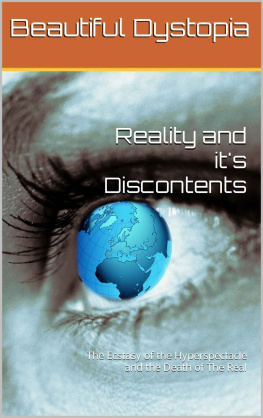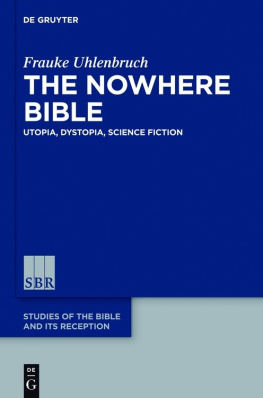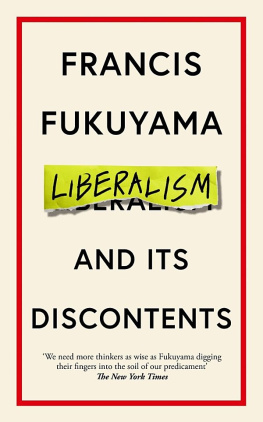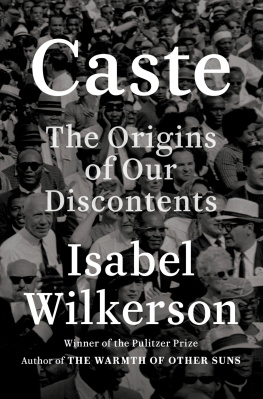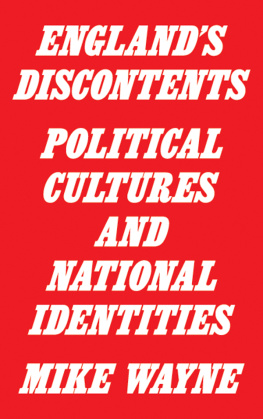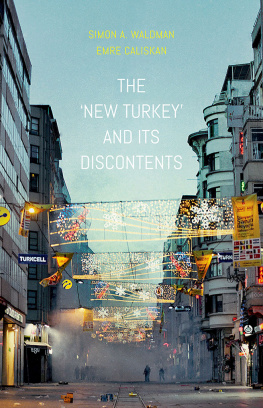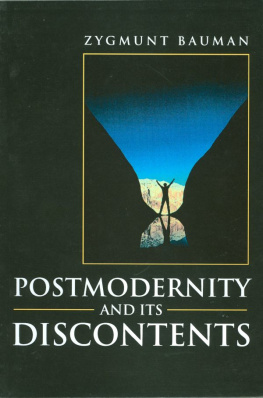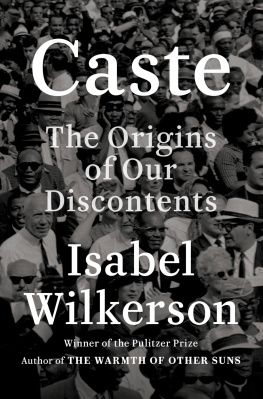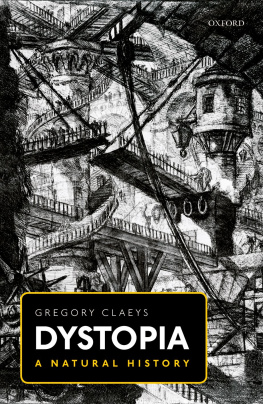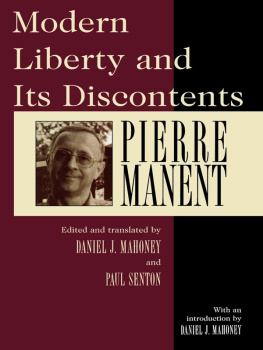Dystopia - Reality and its Discontents
Here you can read online Dystopia - Reality and its Discontents full text of the book (entire story) in english for free. Download pdf and epub, get meaning, cover and reviews about this ebook. year: 2022, genre: Romance novel. Description of the work, (preface) as well as reviews are available. Best literature library LitArk.com created for fans of good reading and offers a wide selection of genres:
Romance novel
Science fiction
Adventure
Detective
Science
History
Home and family
Prose
Art
Politics
Computer
Non-fiction
Religion
Business
Children
Humor
Choose a favorite category and find really read worthwhile books. Enjoy immersion in the world of imagination, feel the emotions of the characters or learn something new for yourself, make an fascinating discovery.
- Book:Reality and its Discontents
- Author:
- Genre:
- Year:2022
- Rating:4 / 5
- Favourites:Add to favourites
- Your mark:
- 80
- 1
- 2
- 3
- 4
- 5
Reality and its Discontents: summary, description and annotation
We offer to read an annotation, description, summary or preface (depends on what the author of the book "Reality and its Discontents" wrote himself). If you haven't found the necessary information about the book — write in the comments, we will try to find it.
Reality and its Discontents — read online for free the complete book (whole text) full work
Below is the text of the book, divided by pages. System saving the place of the last page read, allows you to conveniently read the book "Reality and its Discontents" online for free, without having to search again every time where you left off. Put a bookmark, and you can go to the page where you finished reading at any time.
Font size:
Interval:
Bookmark:
Reality and Its Discontents
The Ecstasy of the Hyperspectacle and the Death of The Real
To Stewart, for convincing me that reality is worth fighting for
Contents
The first note about this book is that the sources are not properly cited. It was easier for me to steal quotes from the web than to copy them from paperback books, so all quotes that are not cited with a reference can be found on the authors Good Reads page. Other quotes have a link, which may be more conducive to the eBook version. The sheer number of quotes may take someone off guard as well. In the 1800s many people carried around a commonplace book, which was a notebook where a person collected quotes from books they read which resonated with them. In a sense, I have turned my digital commonplace book into a book of my own.
Secondly, there is a good bit of jargon in this book. The concept for this book is a synthesis and updating of Guy Debords Society of the Spectacle , Jean Baudrillards Simulacra and Simulation , Neil Postmans Amusing Ourselves to Death and Technopoly , Marshall McLuhans The Medium is the Massage , Daniel Boorstins The Image , and Neal Gablers Life: The Movie . A few terms that may trip up the reader include spectacle, spectacular, hyperreality, The Real, and simulacrum. Debord defines the spectacle as a relationship between people that is mediated by images. If you have ever felt the urge to catch up on Game of Thrones , just so you can be a part of the conversation with your friends, you understand the basics of the spectacle. From here going forward, I distinguish between a spectacle, such as a singular show, and The Spectacle, which is a personification of all of the spectacles into a unified whole that governs contemporary society. The Spectacular is similar, but it does not need to be image based, simply beyond the typical or natural experience. A Taco Bell commercial is a spectacle, while the radioactive nacho cheese from Taco Bell is spectacular.
Hyperreality is the state in which simulated realities are preferrable to reality. Imagine choosing to watch the show Friends rather than hang out with your actual friends; or preferring to read People magazine rather than spend time with actual people; or watch the reality television show The Real World rather than hanging out in, well, the actual real world. Part of this definition involves not knowing what is reality and what is simulated in a highly advanced technological society that is dominated by The Spectacle. Baudrillard writes of the desert of the real, and I have emphasized The Real by personifying reality. To give an idea of why The Real is such a difficult thing to choose in such a hyperreal society, imagine eating several Oreos and then trying to eat a head of plain, uncooked broccoli, or watching an action movie and then immediately trying to read a book from the 1800s. The Spectacular, the hyperreal, is just so much more preferrable and alluring than The Real that not only do we lose touch with reality, but we also forget that there is anything artificial about Oreos or Fast and Furious movies. Lastly, a simulacrum is a copy for which there is no original. There are numerous copies in our society, and sometimes we forget that their origin is fiction. Every time a new Star Wars movie comes out, I debate with friends about whether this is truly a real and authentic depiction of the Star Wars universe. For a moment, I forget that these are copies of a fiction that began in the 1970s rather than a depiction of actual historical events. I dont forget that Star Wars isnt real on an intellectual level, more on a practical level of getting lost in the story and forgetting its importance as fiction. Umberto Eco would call getting caught up in a fiction that bears no resemblance to reality the absolute fake.
The latter part of this book focuses on what I call The Hyperspectacle. While spectacle is a social relationship between people mediated by images, and hyperreality is a simulation that becomes preferrable to reality, a hyperspectacle is the social relationship between people that is mediated by interactive simulations. Think of online video games or social media. Both of those are running interactive simulations that are mediating relationships between people. World of Warcraft and Facebook were two of the first hyperspectacles. I thought it was interesting while talking to friends about this book what a visceral reaction I got when criticizing social media. People I talked to described social media as someone would alcohol (you have to know how to handle it), but always as a problem someone else had, never them. It almost had the feel that they thought I was criticizing their mother how personal it was defending social media. I hope to explain why that is so close to the hearts of so many.
One goal I had for this book was to update the writings of Debord and Baudrillard in a more readable way. Much of their writing seems to suggest that they wish their readers to say, Gee whiz! That guy is smart! I didnt understand a word he wrote! I am of the opinion that writing is useless if it cannot be understood. I have attempted to use some of the original language of Debord and Baudrillard, like spectacle and hyperreality, but make this book more readable and accessible than those and other books of socio-cultural theory. I also tried to make this less smug and condescending. I hope it worked.
Much of the religious language in this book could be interpreted as profane or sacrilegious. While my goal is to shock with this language, it is not to offend or denigrate any religion. When I speak of the death of God, I hope to do so as Nietzsche did: speaking of the death of belief in God, or the death in Gods value in our society. A second interpretation would be that the birth of modernity resulted in the death of God, which could mean that as science and technology increased and made our lives better, we simultaneously lost any deeper meaning. I hope no one will accuse me of heresy with this language, but I thought it was useful to further my point.
Lastly, connecting the ideas of boredom and existential fear as a reason for our escape from reality will be helpful. Humans are incredibly complex creatures that are meant to solve problems. In our time here on Earth, we have solved nearly every problem that pertains to our short-term survival and material wellbeing. However, we have not yet figured out how to cheat death. When we solve all of our problems, or get all of the days work done, we are forced to sit alone with our thoughts and contemplate the cosmic clock that is ticking over our heads. Feeling the presence of the Grim Reaper, we long to escape this existential angst. Neither a belief in the afterlife nor cryogenic freezing in the hopes of resurrection into a transhuman future will calm this racing mind for very long. That is where our tools to escape reality come in. The thesis of this book is that the progression of technologies in media and communication are, 1) a reaction against death anxiety and the existential dread that we will die without ever having gained meaning, 2) altering our perception of reality, and 2) distorting our relationships with each other. I remember showing my grandmother an iPad or iPhone for the first time. She would look at it briefly then laugh and look away. It is as though we had shown her a piece of magic, but a very dumb piece of magic. To her, it was as though we were beings from another world. Our new technology was simultaneously frightening and beyond comprehension. Recently, I have felt like this when being around younger people. It feels like alien abduction when I am having a conversation with someone and lose them to their phone. It is like a person is sitting there engaged with me, feels a vibration in their pocket, then succumbs to a zombie virus. I hope to flesh out why these types of events are so significant.
Next pageFont size:
Interval:
Bookmark:
Similar books «Reality and its Discontents»
Look at similar books to Reality and its Discontents. We have selected literature similar in name and meaning in the hope of providing readers with more options to find new, interesting, not yet read works.
Discussion, reviews of the book Reality and its Discontents and just readers' own opinions. Leave your comments, write what you think about the work, its meaning or the main characters. Specify what exactly you liked and what you didn't like, and why you think so.

